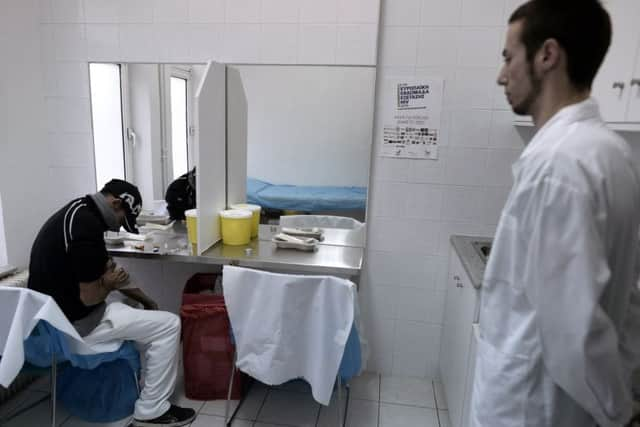Call for treatment ‘culture change’ as drug death figures soar 27%
Almost 1,200 people died from drug consumption north of the Border last year – a 27 per cent rise year-on-year.
Scotland now has a drug-death rate nearly three times that of the UK as a whole. It is also the highest rate in the European Union, although other EU nations have different ways of recording drug-related fatalities.
Advertisement
Hide AdAdvertisement
Hide AdThe damning figures prompted the Scottish Government to make a fresh appeal to the Home Office to be allowed to establish a pilot drug consumption room (DCR) in Glasgow – a city that has a particularly high number of addicts sharing needles in public places.


But opposition parties and experts warned that one DCR alone would not be enough to reverse the growing number of drug-related deaths and that Holyrood ministers must deliver a “culture change” in existing treatment services.
Opioids such as heroin, morphine and methadone are involved in most (86 per cent) drug deaths in Scotland, but they are rarely taken in isolation.
The use of more than one substance is a factor in 85 per cent of all fatalities and is heavily influenced by street drugs such as cocaine.
Public health minister Joe Fitzpatrick described the figures, published yesterday by the National Records of Scotland, as “shocking”.
He said: “Last week, I gave evidence to the Scottish affairs committee and I asked for help in persuading the UK government to either act now to enable us to implement a range of public health-focused responses, including the introduction of supervised drug consumption facilities, or devolve the power to the Scottish Parliament so that we can act.”
But the Scottish Conservatives criticised SNP ministers for their repeated demands for the introduction of a DCR – a policy the Home Office has consistently signalled it will not allow.
Tory public health spokeswoman Annie Wells said: “The SNP has had control over health and justice for 12 years, yet hasn’t managed to bring in anything that comes close to dealing with this problem.
Advertisement
Hide AdAdvertisement
Hide Ad“As these figures show, whatever drugs strategies it has adopted have only made things worse. Predictably, in their desperation, the Nationalists are now pinning their hopes on consumption rooms because they know it’s something the UK government does not agree with.
“They should be focusing their efforts on rehabilitation and abstinence-based recovery, the very services they have cut to the bone.”
Kirsten Horsburgh, a strategy co-ordinator with the Scottish Drugs Forum charity, told the BBC the number of deaths in 2018 was the result of “a sad and desperate situation”. She said changes to how addiction in Scotland is treated could no longer wait.
“This doesn’t need to involve politics,” she said. “It requires a culture shift in treatment services.
“We talk a lot about waiting times and people getting access within three weeks. When actually you look at the figures, people are maybe getting an appointment within three weeks, but to actually get on a prescription, for example methadone, people can be waiting several months.
“We need to make sure we are engaging people in treatment quickly and they are not being discharged for what is deemed to be non-compliance with the service’s expectations.
She continued: “Drug consumption rooms are not going to solve the problem of drug-related deaths across the whole of Scotland.
“We need to make significant changes now.”
Dr James Nicholls, chief executive of Transform Drug Policy Foundation, described the number of drug-related deaths as an “avoidable tragedy”. He said: “The Home Office must allow Scotland to adopt a health-lead approach, including allowing supervised drug consumption rooms, in order to tackle the crisis.
“Growing calls for the decriminalisation of people who use drugs in Scotland should also be heeded, as we know from Portugal that this can reduce deaths.”